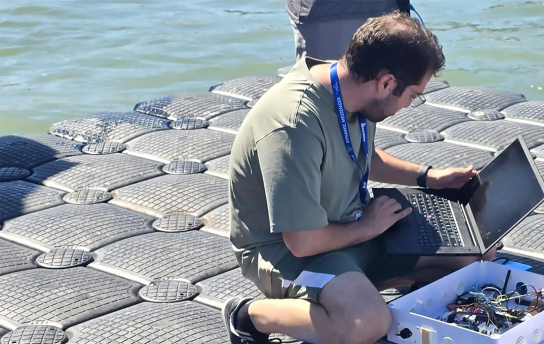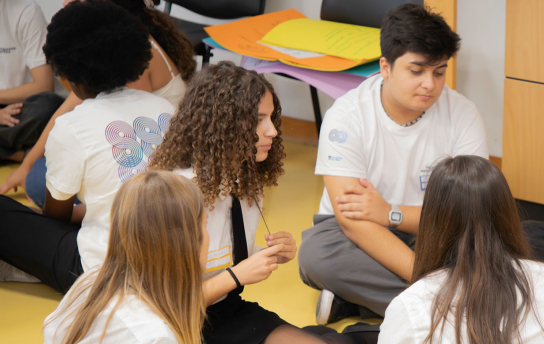ISEL participated in Naval-REX25, part of REPMUS 2025 (Robotic Experimentation and Prototyping with Maritime Unmanned Systems), the world's largest exercise in robotics and unmanned vehicles at sea. The event, organized by the Portuguese Navy, began on September 8th in Tróia and Sesimbra and attracted over 2,000 participants from 32 countries.ISEL was represented by Professor Carlos Gonçalves (DEI/ISEL) and Alexandre Figueiredo, a student in ISEL's Master's in Informatics and Multimedia Engineering program. He participated in the initiative as part of his Master's thesis, which consists of developing a cyber-physical system for autonomous control of Unmanned Surface Vehicle (USV) vessels. The system is being developed in a modular, expandable format, focused on the integration of multiple motors, sensors, and communication interfaces, ensuring robustness and adaptability to different operational scenarios.This participation was in collaboration with the Infante D. Henrique Nautical School (ENIDH), which led the Portuguese team, also bringing together members from the Instituto Superior Técnico and Universidade Nova. The presented works covered areas such as robotic sailing, autonomous vessels, communications, solar energy, and navigation algorithms, reflecting the national commitment to integration between academia and the defense and security sectors.This participation represents ISEL's commitment to supporting academic projects connected to the professional environment and current technological challenges.
The Polytechnic of Lisbon's Peer Mentoring Program - MENTori@IPL - officially began with the first sessions of the 2025/2026 edition. The initiative, now in its fifth year, implemented in six of the eight IPL schools (ESCS, ESD, ESELx, ESSL, ISCAL, and ISEL), aims to support the integration of students now entering higher education by fostering close relationships, sharing, and support among peers.The first session of the initial mentor training took place on September 2, 2025, at the Escola Superior de Comunicação Social (ESCS), in the Vítor Macieira auditorium. It featured several integration activities for the student mentors, aiming to create an initial informal connection between participants. During the opening ceremony, the host, ESCS President André Sendin, reinforced the active role of everyone involved, emphasizing: "I continue to support these programs because I believe it's not just about helping others integrate, it's also about integrating ourselves. I hope you enjoy this mentoring program."In the same session, Cristina Borges de Azevedo, IPL Vice President for Academics, Pedagogical Innovation, Quality, and Erasmus+, praised the volunteer spirit of the participating students, emphasizing IPL's commitment to promoting the integration of new students as an opportunity for academic, personal, and social enrichment. He also highlighted this year's new feature: the MENTori@IPL program is now part of the newly created Student Support Center, a multifunctional structure dedicated to the well-being and support of the student community. João Lobato, administrator of the IPL's Social Action Services, spoke of the importance of mentors' role in building a more cohesive and collaborative academic community. "Those who signed up for this program have a special calling: they are agents of social animation and leadership. This is an important step toward improving the ecosystem within institutions." Conceição Soares, a psychologist with the Psychological and Educational Support Services (SAPE), argued that the program should focus on human connections: "We want to combat what is already known as 'relational winter.' This should be a program focused on fostering relationships, which are our first line of support in any challenging or difficult situation."The second MENTori@IPL mentor training session took place at the Instituto Superior de Engenharia de Lisboa (ISEL), in the auditorium on the 3rd floor of Building C, on September 9, 2025. The training, lasting approximately five hours and mandatory for new mentors, included morning sessions with institutional interventions, welcoming moments, and reflection activities on the role and responsibilities of the mentor, including tips for resolving challenging situations. The program's stages, schedule, and forms of recognition for participation (certificate, diploma completion, and scholarship) were also presented. During the afternoon, the new mentors joined colleagues from previous sessions to share testimonials and group dynamics, reinforcing integration and active involvement in the academic community.This year, mentor training began earlier to expedite the process of assigning mentors to newly admitted students, who are already registering as mentees.By the date of the second initial training session, 232 mentors had signed up, 74 of whom had already served in this role last academic year. Registration will continue, and new training sessions will be held to further expand the MENTori@IPL Program. This academic year, the program will also launch an ongoing mentor training program throughout the academic year, based on the five basic relational acts: respect, listen, help, communicate, and share information. About the MENTori@IPL ProgramMENTori@IPL is coordinated by the Social Action Services of the Polytechnic of Lisbon (SAS-IPL), in collaboration with the schools and institutes that comprise the IPL. The program was created in the 2021/2022 academic year and aims to promote the integration of new students into their school and program, as well as their personal and academic development. By focusing on these core objectives, it will be possible to contribute to broader outcomes, notably academic success and the development of engaged citizens. [flickr-photoset:id=72177720328834234, size=q, num=10]Ver no flickr Texto de MFC/GCI/IPLImagens de JC/GCI/IPLVideo de BP/GCI/IPL
ISEL welcomed 34 students under the Erasmus+ program last Wednesday, September 10th, who are now beginning their academic experience in Lisbon.Of the total participants, 15 are pursuing master's degrees and 19 are pursuing bachelor's degrees, representing 13 different nationalities: Hungary, Germany, Lithuania, Spain, Italy, Turkey, the Czech Republic, France, Belgium, Poland, the Netherlands, Brazil, and Romania.The new students will study nine different areas of study, including: Civil Engineering, Electrical Engineering, Electronic, Telecommunications, and Computer Engineering, Mechanical Engineering, Mathematics Applied to Technology and Business, Industrial Engineering and Management, Computer and Computing Engineering, Computer and Multimedia Engineering, and Chemical and Biological Engineering.The welcome session included an institutional reception, a presentation of ISEL's services, and a guided tour of the campus.
On September 10th, ISEL opened its doors to welcome the new generation of engineers, physicists, and mathematicians.ISEL President, Professor José Nascimento, welcomed them with a message of confidence and inspiration, reminding them that each student is now part of a community building the future.ISEL Vice President, Professor Carla Viveiros, presented the richness of extracurricular activities and student groups, reinforcing that the academic experience extends far beyond the classroom.ISEL Student Association President, Tomás Moscatel, brought the energy of ISEL, highlighting the cultural and athletic opportunities that make campus life vibrant and unforgettable.Between speeches, the delivery of Welcome Kits, and a campus tour, the new students were greeted with enthusiasm and motivation for a journey that combines academic excellence, personal growth, and a vibrant community.
[flickr-photoset:id=72177720328976506, size=q, num=10]Ver no flickr
ISEL Professor José Sobral (DEM/ISEL) participated in the RTP3 program 360º, representing the Portuguese Association of Engineers.His speech was part of the panel dedicated to the recent accident at the Glória Elevator, focusing on the importance of maintenance and its potential links to the incident.The nomination by the Portuguese Association of Engineers was based on his experience as a member of the College of Mechanical Engineering (South Region), his specialization in maintenance from the Association, as well as his academic and professional trajectory in this field: he has taught at ISEL for over 20 years, is a former President of the Board of Directors of the Portuguese Association of Maintenance and Asset Management (APMI), and is currently President of the General Assembly of this Association.The program can be viewed on RTP Play.
The Foundation for Science and Technology (FCT) recognizes the excellence of research developed at Lisbon Institute of Engineering (ISEL)..Several research and development (R&D) units for which ISEL is a Managing Entity or Participating Entity were recently approved for funding under the FCT's multi-year competition.ISEL is the Managing Entity for centers whose scientific output is of excellence, including the CTS - Center for Technologies and Systems (Excellent), NOVA LINCS - Laboratory for Computer Science and Informatics (Excellent), and CIMA - Center for Research in Mathematics and Applications (Excellent), as well as CeFEMA - Center for Physics and Engineering of Advanced Materials (Very Good), CFTC - Center for Theoretical and Computational Physics (Very Good), CERENA - Center for Natural Resources and Environment (Very Good), and IDL - Instituto Dom Luiz (Very Good).At the same time, ISEL is a participating entity in highly prestigious research units, such as IDMEC - Institute of Mechanical Engineering (Excellent), CQE - Center for Structural Chemistry (Very Good), and CEMAT - Center for Computational and Stochastic Mathematics (Very Good).In addition to these, the FCT also awards Excellent or Very Good ratings to other research and development (R&D) units to which ISEL faculty belong.The FCT periodically evaluates R&D units, assigning a rating that determines funding for the following multi-year period. The now-completed evaluation focused on scientific and technological activities carried out between 2018 and 2023, as well as the objectives, strategy, and activity plan defined for 2025-2029.These results reflect the commitment and quality of the research developed by ISEL faculty, researchers, and students, supported by national and international collaboration networks and strategic partnerships with industry and society.






